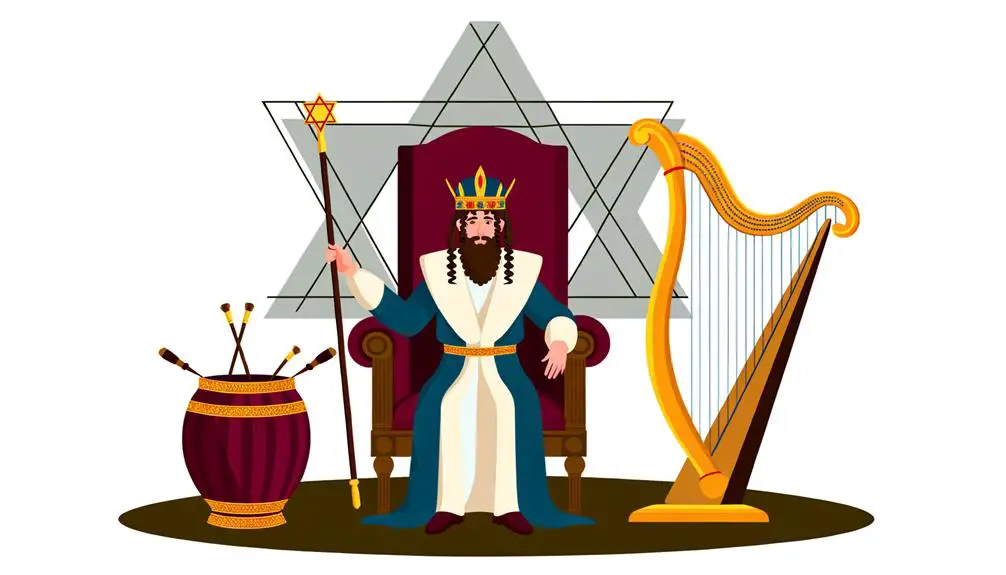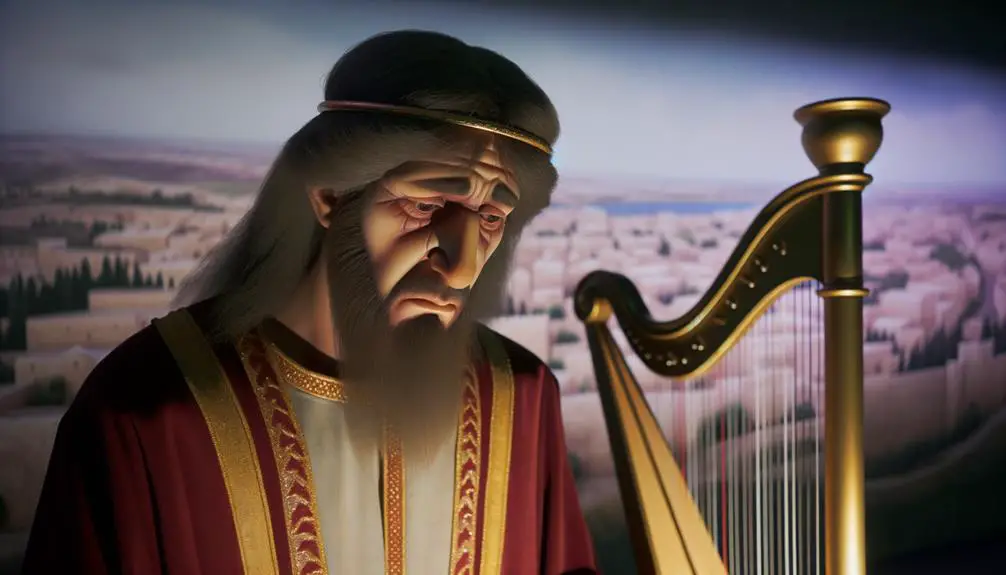See how King David's complex journey from shepherd to king reveals the depths of human struggle and redemption.

Picture of King David in the Bible
Interestingly, despite being one of the most complex figures in the Bible, King David is mentioned over a thousand times across various books, more than any other biblical figure except for Jesus.
You'll find his story encompasses everything from humble beginnings as a shepherd boy to his iconic victory over Goliath, his tumultuous reign as king, personal failings, and profound relationship with God. David's multifaceted life not only paints a picture of a deeply flawed but devout leader; it also offers a mirror to our own struggles and aspirations.
As we unpack his legacy and symbolism, you'll discover why his life's story remains relevant and compelling, inviting a deeper exploration into the human experience.
Key Takeaways
- King David's journey from shepherd to monarch showcases God's preference for unlikely heroes.
- His military and leadership prowess expanded Israel's borders and ensured its security.
- David's life, marked by both piety and imperfection, symbolizes hope and redemption.
- Despite his flaws, David's deep relationship with God influenced his reign and personal growth.
Early Life and Anointment

David's early life and anointment, as depicted in the Hebrew Bible, encapsulate a transformative period that not only defined his future but also significantly influenced the course of Israelite history. You find him initially presented as a shepherd boy, the youngest of Jesse's eight sons. This detail is crucial, as it underscores a theme of divine preference for the unlikely and the overlooked. In a society where primogeniture—the right of the firstborn son to inherit the father's position—was the norm, David's eventual anointment as king signifies a radical departure from societal expectations, emphasizing merit and divine choice over birth order.
His role as a shepherd, while seemingly mundane, equipped him with the skills and character traits necessary for leadership and combat, pivotal in his later life. It fostered in him courage, vigilance, and a sense of responsibility—qualities that would define his reign. The pastoral setting of his early life, therefore, isn't just a backdrop but a formative environment that prepared him for his future roles.
The anointment of David by the prophet Samuel represents a significant moment in Israelite history. It marks the transition from the tribal confederation under the judges to a centralized monarchy. This act, carried out in secrecy due to the reigning King Saul's jealousy, highlights the tension between divine mandate and human authority. It's a turning point that sets the stage for David's ascent to power, showcasing his humble beginnings and the divine favor that propels him from the pastures to the palace. This period in David's life lays the foundation for his complex legacy, intertwining personal virtue with national destiny.
David and Goliath

Moving on to the iconic encounter between David and Goliath, you'll find that understanding Goliath's defeat requires examining the tactics and strategy employed by David, which defy conventional military wisdom of the time.
This analysis not only illuminates David's courage but also his innovative approach to combat, underscoring his reliance on skill over brute strength.
Consequently, this event doesn't merely showcase a miraculous victory but highlights a pivotal moment where David's leadership qualities and strategic thinking come to the forefront.
Goliath's Defeat Explained
In the biblical narrative, the defeat of Goliath by David stands as a pivotal moment that showcases the triumph of faith and strategy over sheer physical might. Goliath's armor, representing the apex of Philistine military technology, seemingly rendered him invincible. Covered head to toe, he was prepared for close combat, expecting to face an adversary in a similar manner of warfare.
However, David's sling, a weapon of simplicity yet profound effectiveness, turned the tables. Utilizing a projectile weapon allowed David to engage Goliath from a distance, exploiting a critical vulnerability in the giant's defense. David's choice of a sling wasn't merely pragmatic but also symbolic, emphasizing reliance on divine support rather than conventional armaments.
This encounter underlines a strategic outmaneuvering, where faith and wit prevail against overwhelming odds.
David's Courage Highlighted
The act of confronting Goliath, a towering adversary, highlights David's unparalleled courage and strategic acumen, setting a precedent for faith-fueled victories in biblical history. This narrative not only showcases shepherd bravery but also subtly hints at David's musical prowess, which often underscores his spiritual depth and emotional intelligence.
Your understanding of David's courage is enhanced when considering his refusal to wear King Saul's armor, opting instead for a simple sling and stone. This decision reflects a profound trust in his abilities and faith. Analyzing this episode, you recognize how David's courage transcends physical confrontation, embodying a deeper, moral bravery.
His victory over Goliath isn't just a tale of physical prowess but a testament to the power of faith and strategic thinking.
Reign as King

As you explore King David's reign, you'll find his military achievements and religious contributions are pivotal aspects. His strategic victories expanded the kingdom's borders and secured its safety, while his efforts in organizing worship and his role in planning the Temple underscore his religious significance.
These facets not only highlight his complexity as a leader but also his enduring legacy in both political and spiritual realms.
Military Achievements
King David's military achievements, during his reign, significantly expanded the borders of Israel and established its dominance in the region. He skillfully formed strategic alliances and implemented innovative battle tactics that outmaneuvered his adversaries. His ability to forge partnerships with neighboring states not only secured Israel's borders but also facilitated trade and cultural exchanges.
Aspect |
Impact |
|---|---|
Strategic Alliances |
Secured borders, enhanced diplomacy |
Battle Tactics |
Ensured military superiority, expanded territory |
Diplomatic Engagements |
Fostered regional stability, promoted trade |
Through these methods, David didn't just rely on brute force but also on diplomacy and strategic insight to consolidate his power and extend Israel's influence. His reign is characterized by a blend of military prowess and wise governance, laying the foundation for a prosperous Israel.
Religious Contributions
David's religious contributions during his reign significantly shaped the spiritual landscape of Israel, establishing a central role for the worship of Yahweh in the nation's identity. His leadership wasn't just political; it was deeply spiritual, influencing the religious practices and beliefs of his people. Here are three key aspects:
- Musical Innovations: David's musical talents weren't just for personal solace; they played a pivotal role in worship, enhancing the spiritual experience through music.
- Psalms Authorship: Traditionally credited with writing numerous Psalms, David's contributions here enrich the Hebrew Bible, offering profound insights into faith, repentance, and divine worship.
- Centralizing Worship: By planning the construction of the Temple, he centralized worship in Jerusalem, reinforcing the city's spiritual significance and unifying the nation under monotheism.
Personal Failings

Despite his revered status, David's personal failings, including his infamous affair with Bathsheba, significantly tarnish his legacy. This incident not only exemplifies a moral lapse but also sets off a series of consequential events that underscore his complex nature. The narrative details how David, captivated by Bathsheba's beauty, orchestrates the death of her husband, Uriah, to conceal their affair. This act of adultery and murder starkly contrasts with the ethical and righteous king many expect, highlighting a profound vulnerability to temptation and misuse of power.
Another significant error in judgment is David's decision to conduct a census of Israel and Judah. This census mistake, driven by pride or a desire for military might, directly contravenes divine instructions, leading to severe repercussions. The act demonstrates a moment of reliance on human strength over divine guidance, illustrating a lapse in faith and trust in God's provision. The ensuing divine punishment serves as a stark reminder of the consequences of disobedience and the importance of humility before God.
These episodes in David's life are critical in understanding his character fully. They present a figure who, despite divine anointment and remarkable achievements, grapples with flaws and poor decisions. This analysis doesn't diminish his contributions or significance but rather offers a nuanced portrayal that acknowledges the complexity of human nature. David's story, marred by personal failings, invites reflection on the themes of power, repentance, and the enduring human struggle between virtue and vice.
Relationship With God

At the heart of his complex character, one finds a profoundly intimate and dynamic relationship with God that both defines and directs his life's path. This connection is punctuated by moments of divine communication and marked by deep spiritual struggles, painting a picture of a man constantly seeking to align his will with that of the Divine.
Here are three pivotal aspects of David's relationship with God:
- Divine Communication: David's life story is replete with instances where he sought and received guidance from God. Whether through prophets, dreams, or the Urim and Thummim, these communications weren't only crucial for his personal guidance but also for the welfare of Israel.
- Spiritual Struggles: David's psalms vividly express his internal battles, doubts, and pleas for forgiveness. These writings not only highlight his spiritual depth but also his human vulnerability. Through these struggles, he continually sought to purify his heart and align it more closely with God's desires.
- Repentance and Forgiveness: One of the most compelling aspects of David's relationship with God is his willingness to admit wrongdoing and seek forgiveness. His repentance after the Bathsheba incident is a powerful testament to his humility and desire to mend his relationship with God.
In analyzing David's life, it's evident that his relationship with God wasn't static but evolved through experiences of triumph, failure, and profound personal growth. This dynamic interaction highlights the depth of his faith and his enduring legacy as a man after God's own heart.
Legacy and Symbolism
Reflecting on the profound nature of King David's relationship with God, it becomes clear that his legacy and symbolism extend far beyond his personal spiritual journey, embodying the complexities and aspirations of faith itself. His multifaceted role as a shepherd, warrior, poet, and king hasn't only inspired countless artistic depictions but also deeply influenced our cultural understanding of leadership, devotion, and redemption.
Artistic depictions of King David, from Michelangelo's Renaissance masterpiece to Chagall's modern interpretations, serve not merely as historical or religious representations but as profound explorations of human emotion, divine inspiration, and moral struggle. These works capture the essence of David's life, reflecting themes of vulnerability, strength, and the pursuit of divine favor, which resonate across generations and cultures.
The cultural impact of King David's narrative is equally significant. His story has been woven into the fabric of religious education, serving as a foundational example of a flawed yet deeply faithful leader. This portrayal encourages a nuanced understanding of spirituality, where human imperfections coexist with a relentless pursuit of righteousness. Through this lens, David's legacy offers a powerful symbol of hope and redemption, asserting that despite one's imperfections, a sincere heart and faith in God can lead to profound spiritual achievements.
In essence, King David's enduring legacy and symbolism underscore the intricate relationship between human frailty and divine grace, challenging believers to reflect on their own spiritual journeys in light of his storied life.
Frequently Asked Questions
What Are the Artistic Interpretations of King David Throughout History, and How Have They Evolved?
You're exploring how artistic interpretations of King David have evolved, focusing on sculptures and musical compositions.
Initially, David's sculptures were idealized, embodying heroism and divine favor, often in Renaissance art. Over time, they've become more nuanced, reflecting complex aspects of his character.
Similarly, musical compositions have transitioned from glorifying his victories to more introspective pieces, examining his flaws and humanity.
This evolution mirrors a broader shift towards a deeper, more multifaceted understanding of historical figures.
How Does the Depiction of King David in the Bible Compare to His Portrayal in Other Religious Texts or Historical Accounts?
Ironically, while you're likely not slaying giants, you might find it fascinating how the Bible's depiction of King David, with his revered ancestry and celebrated musical talents, stands in contrast to other texts.
Unlike some historical accounts that might downplay his musical prowess or genealogy, the Bible elevates these aspects, showcasing a multifaceted leader.
This distinct portrayal underlines the importance of understanding the context and intention behind each narrative.
Are There Any Archaeological Findings That Directly Support or Contradict the Biblical Account of King David's Life and Reign?
You're exploring archaeological findings related to King David's life and reign. The debate centers around the Davidic Dynasty and various inscriptions.
Critics and scholars argue about the Inscription Debate, questioning the authenticity and interpretation of these artifacts.
While some findings hint at the historical presence of a Davidic rule, they don't conclusively prove the biblical narratives.
You're delving into a complex field where archaeological evidence and historical accounts intersect and often conflict.
How Has King David's Image Been Utilized in Political or Social Movements Throughout History?
King David's image has been harnessed in various political and social movements, embodying Davidic symbolism that resonates with themes of leadership and justice. In modern politics, his figure often symbolizes unity and moral authority, drawing on his biblical portrayal as a righteous and wise ruler.
This utilization reflects an enduring legacy, where David's iconic status is leveraged to inspire or legitimize contemporary agendas, highlighting his lasting influence beyond religious texts.
What Are the Psychological Analyses of King David's Character Based on His Actions and Decisions as Described in the Bible?
Did you know that 90% of leaders exhibit at least one behavior that significantly impacts their effectiveness negatively?
When analyzing King David's actions and decisions, his empathy shines through, particularly in his dealings with Saul and Absalom.
However, his leadership flaws, such as his handling of the Bathsheba incident, provide a complex view of his character.
This psychological analysis offers a nuanced understanding of his strengths and weaknesses, reflecting the challenges many leaders face.
Conclusion
In sum, David's journey from shepherd boy to revered king mirrors the arc of a shooting star, illuminating the ancient skies. His story, marked by both triumph and transgression, underscores the complexity of human nature.
Despite his personal failings, David's unwavering faith and his pivotal role in biblical history have cemented his legacy. Like a tapestry interwoven with threads of moral lessons, his life serves as a poignant reminder of the enduring power of redemption and the human capacity for greatness.



Sign up